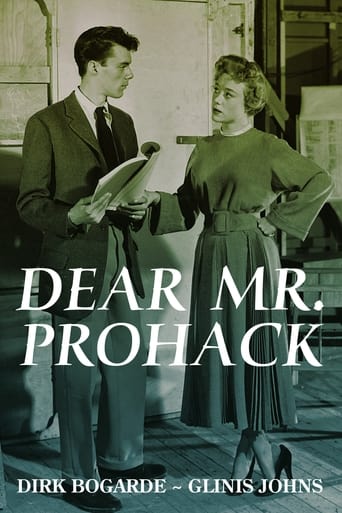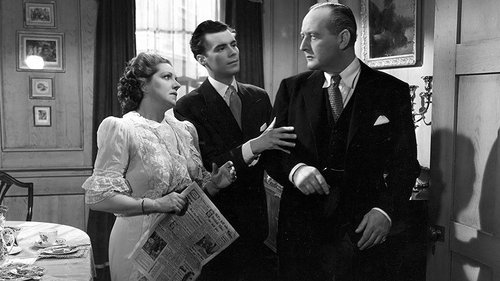howardmorley
Cecil Parker (Mr. Prohack) gives a polished performance and comic portrayal of a stuffy post war civil servant who is involved with red tape & protocol while controlling the impecunious nation's purse strings through his job at the British Treasury during a time of acute post WW11 shortages, rationing & austerity.In this endeavour, he is ably supported by Mrs Prohack (Hermione Baddeley) with his son & daughter in tow.For someone like me who was born in 1946, these early post war films have a certain resonance while I remember that the nation was on food rationing until 1955.So the references to privation,(harder for the working class family) for the middle class family, involved high taxation and no proper domestic help.In one scene Cecil Parker rolls up his sleeves & helps with the washing up, (dishwashers were far into the future).Seasoned viewers of British actors will spot little cameo performances by Michael Pertwee (Dr Who no:3) who had a comically babbling voice ("The Navy Lark") , Ian Carmichael, and later film producer Brian Forbes.The love interest is provided by Glynis Johns romanced by a young Dirk Bogarde.What throws the characters into a "tizz" is to be informed by Mr Prohack that he has been left in the will of a colleague £250,000 (more like £2,500,000 in 2014 money adding 65 years inflation).This is like giving a drunkard the keys to a brewery and of course provides the humour as all the Prohack family decide to spend Dad's newly inherited wealth in a bizarre fashion.There is an unexpected superimposed dream sequence for Mr.Prohack who is in bed while "under the weather", which involves medieval knights and various surreal images.I was confused what the moral of the film was or what message for the viewer the producer intended to convey but soon after Mr Prohack's ill advised investments go under, a colleague who invests on the stock market, informs him he has made another profit of £250,000.When he is on a private aeroplane heading to Paris with his lady friend, Mr Prohack speaks the most appalling French to the French pilot.I feel sure a senior British civil servant would have done better but it is all done for comic effect.The end of the screen play quotes an extract towards the end of Hamlet's Soliloquay: "Thus conscience doth make cowards of us all", referring to the suitcase full of banknotes deposited on his civil servant's desk.I rated this film 6/10.
malcolmgsw
The other review being from an American,obviously doesn't grasp the nuances of the plot.When the film was made the country was in the grip of an austerity period far worse than the one we are in.Cecil Parker was a civil servant at the Treasury who kept a tight control on everyones spending.A strict currency limit being imposed on anyone who went abroad,for example Cecil Bernstein was refused permission by the Treasury to buy RKO from Howard Hughes.So the idea of a civil servant coming into such money however legally would have been considered quite outrageous.Alas the script writers clearly had the kernel of a good idea but weren't really able to develop it in a satisfactory manner.some of the plot seems derived from "Brewsters Millions".Cecil Parker does his best with the material.There is a very young Jon Pertwee and Denham Elliott and Dirk Bogarde on view.However the film fails to live up to its promise.
robluvthebeach
Saw this film online and was completely surprised by how charming it was with some very funny moments. Cecil Parker is a very uptight businessman, with a hold on all his money, and then he wins an unexpected windfall. His wife, Hermoine Baddeley, immediately wants to spend everything, much to his consternation. (The dream sequence in which she is dressed in a harem outfit, has to be seen to be believed). Glynis Johns is wonderful as his secretary, full of common sense, and a foil for his son's character (played by Dirk Bogarde). Their tussle in one sequence is really pretty funny. Sheila Sim is Parker's daughter who refuses to participate in their wealth, having become involved with someone who is anti-captialism. On the other hand, Hermoine Baddeley wants to throw her daughter a huge wedding reception, which leads to many complications and a neat plot twist. Heather Thatcher is the 'other woman' but plays it cool and smart, so you actually like her character. The ending has a good twist of losing, retrieving and then putting the money to good use.




